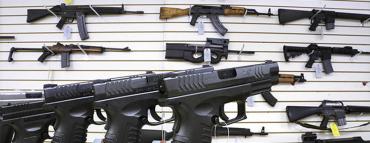
The cockamamie suggestion of an assault weapons registry is back in the public conversation. That's a good thing. Thank you, state economists -- you've given me a chance to beat my drum for the Second Amendment.
Meeting Tuesday in Tallahassee, a panel of Florida economists weighed the burden of a proposed constitutional amendment that aims to ban assault weapons -- but grandfather in the guns already circulating, as long as their owners register them with the state.
I'm talking about a gun registry.
The unsavory practice of the government taking names and compiling lists.
Lists of whom? Lists of law-abiding citizens. We know from other states and nations that tried this, criminals don't register their firearms. Only the grudging good guys do.
Unsurprisingly, the panel meeting Tuesday hardly sounded as if it were clearing the proposed amendment for takeoff:
-
Members estimated the cost of building a Florida assault weapons registry at about $4 million;
-
Add to that $3 million ANNUALLY to maintain it;
-
It would take a year and a half, not 30 days as required, to get the registry up and running (“When you are talking about a gun registry, you are talking about potentially millions of guns,” said Ron Draa, Florida Department of Law Enforcement's director of external affairs.);
-
Draa told the panel to add in the cost of background checks; and
-
There's also a skewing factor -- the number of out-of-state people who would move to Florida and register guns.
Those are administrative details. But there are philosophical problems that make this constitutional amendment particularly offensive to me.
My husband and I never owned a gun and neither did any of our kids. But we always understood why our Founding Fathers put the Second Amendment in the Bill of Rights, and it wasn't so we could hunt ducks and shoot clay targets.
If Ban Assault Weapons NOW (BAWN), the political committee behind this hugely offensive ballot proposal, want to believe "well-regulated militia" means the National Guard -- as the gun control crowd insists we interpret the Second Amendment -- if they want to believe it's perfectly OK to ban the guns they don't like and leave us with the ones that meet with their approval, who's going to look it up and prove us wrong?
By all accounts, of all the powerful memories and emotions the Founding Fathers brought to the constitutional debates, none was stronger than their fear of standing armies. As David Young, author of "The Origin of the Second Amendment" observed: "The necessity of an armed populace, protection against disarming of the citizenry, and the need to guard against a select militia and assure a real militia which could defend liberty against any standing forces the government might raise were topics interspersed throughout the ratification period."
In other words, the Founding Fathers didn't want Americans powerless against their own government.
As for a gun registry, we only havw to look North to Canada to see it won't work.
Canada attempted a "long gun registry" -- a registry of all rifles and shotguns in the country. (They already had a handgun registry.) They estimated there were about 8 million long guns in private hands. Legislators were told that the registry would cost in the neighborhood of $119 million to implement, with $117 million of the cost covered by registration fees -- so for $2 million, they'd be able to register all 8 million guns, and "it would go quickly."
The law passed in 1995, with licensing starting in 1998 and all long guns were to be registered by Jan. 1, 2003. By 2000, it was obviously not going according to theory. Registrations were backlogged and riddled with errors, and costs were WAY over estimates. An audit in December 2002 showed that costs were going to exceed $1 billion by 2005, with an income from registration fees of only $145 million.
Gun registries are sinister. They are about a loss of privacy, about a fear of freedom, but most of all, they are about confiscation. If registries have prevented a single homicide, let alone a mass murder, somebody will have to show me.
One last point: There is no such thing as cyber security. Consider that even the NSA has been hacked. So imagine for a minute all gun owners registering every weapon they own to their name and address. Now imagine some criminal hacking that registry and building an Uber-style app showing where each gun is located, what kind it is, and who lives in the house.
I'm not a conspiracy theorist, but in this day and age, it's a hacker's world out there. Create a gun registry of any type and risk creating a cottage industry for felons to raid.
The News Service of Florida has reported that Ban Assault Weapons NOW still is waiting for 1) the Florida Supreme Court to sign off on the ballot wording and 2) the Division of Elections to receive 766,200 valid petition signatures. Two days ago BAWN had turned in a total of 105,062 valid signatures.
Economists are set to meet again today on the proposed amendment's financial impact.
Reach Nancy Smith at nsmith@sunshinestatenews.com or at 228-282-2423. Twitter: @NancyLBSmith


